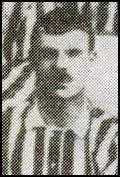George Spry Woodhall

George Spry Woodhall was born in West Bromwich on 5th September 1863. The West Bromwich Strollers club was formed in 1879 by a group of young men from the Salter's Spring Factory. Initially they played cricket at Dartmouth Park but in 1882 they decided to form the West Bromwich Albion football club. Woodhall, who worked at the factory, joined the club.
WBA entered the FA Cup in the 1883-84 season but lost in the first round to Wednesbury Town. The following year they played Aston Villa away in the 3rd round. Over 22,000 people saw WBA beat their local rivals 3-0. After beating Druids they faced the mighty Blackburn Rovers in the 5th round. A record home attendance of 16,393 saw Blackburn win 2-0.
In the 1885-86 season WBA beat Wolverhampton Wanderers (3-1), Old Carthusians (1-0), Old Westminsters (6-0) and Small Heath Alliance (4-0) to reach the final of the competition to be played at the Kennington Oval. Woodhall played at outside-right. Their opponents were Blackburn Rovers, who were appearing in their third successive final. Four of the players, Fergie Suter, Hugh McIntyre, Jimmy Brown and Jimmy Douglas were playing in their fourth final in five season. WBA dominated the match but Herbie Arthur, the Blackburn goalkeeper, made several good saves and the game ended in a 0-0 draw.
The replay took place at the Racecourse Ground, Derby. A goal by Joe Sowerbutts gave Blackburn Rovers an early lead. In the second-half James Brown collected the ball in his own area, took the ball past several WBA players, ran the length of the field and scored one of the best goals scored in a FA Cup final. Blackburn now joined the Wanderers in achieving three successive cup final victories.
This was a magnificent achievement for a team of amateurs. Seven members of the team that reached the 1886 FA Cup Final still worked at Salter's Spring Factory. This included George Woodhall, Bob Roberts, Charlie Perry, George Timmins, Ezra Horton George Bell, and Harry Bell. All eleven players were born within a six-mile radius of West Bromwich. At the time the town had a population of only 56,000 people.
In the 1886-87 season they beat Burton Wanderers (6-0), Derby Junction (2-1), Mitchell's St George (1-0), Lockwood Brothers (2-1), Notts County (4-1), Preston North End (3-1) to reach the final against Aston Villa. For the second successive year WBA lost the final 2-0 and Woodhall was denied a second cup-winning medal.
WBA was in great form in the 1887-88 season, scoring 195 goals in 58 first-team matches. Woodhall was in good form and on 4th February, 1888, he won his first international cap playing for England against Wales. Woodhall scored one of the goals in the 5-1 victory. He retained his place for the game against Scotland on 17th March and helped his country achieve a 5-0 win.
WBA also enjoyed another good run in the FA Cup beating Stoke City (4-1), Old Carthusians (4-2) and Derby Junction (3-0) to reach the final against Preston North End. A crowd of nearly 20,000 watched the final at the Kennington Oval on 24th March, 1888. The 19-year-old Billy Bassett was the star of the game and after one long dribble he passed to Jem Bayliss who scored the opening goal. Fred Dewhurst scored an equalizer early in the second-half but WBA gradually got the upper-hand. According to Philip Gibbons in Association Football in Victorian England: "Bassett tormented their defence". He eventually provided the cross for George Woodhall to score the winning-goal ten minutes from time.
The first season of the Football League began in September, 1888. WBA's professional players received 10 shillings a week, with no bonuses or expenses. Preston North End won the first championship without losing a single match and acquired the name the "invincibles". West Bromwich Albion finished in 6th place with Billy Bassett ending up as the club's top scorer with 14 goals in 25 games. Woodhall scored three goals in ten games for the club.
Woodhall lost his place in the side and in 1891 he was transferred to Wolverhampton Wanderers. After only scoring one goal in 18 games he left to play non-league football at Berwick Rangers and Oldbury Town.
George Woodhall died in 1924.
